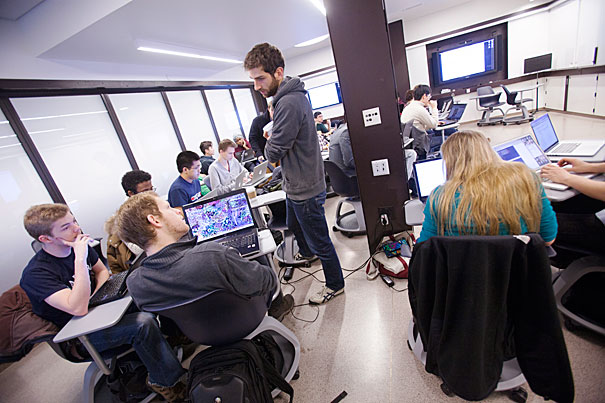
Harvard Assistant Professor Luke Bornn teaches a statistics class on big data in Stone Hall in Quincy House, Harvard’s first House renewal project.
Stephanie Mitchell/Harvard Staff Photographer
House renewal and rebirth
A home again, modernized Stone Hall draws praise; McKinlock Hall nearly refurbished
After years of gathering input from students, faculty, and staff, after lengthy and meticulous planning, and after 15 months of intense construction, the first House renewal project, Quincy House’s Stone Hall, opened to students last fall, revealing invigorating social and academic spaces. Based on student reactions, the renewal is proving to be a success.
“This has drastically exceeded my expectations,” said Kevin O’Donnell ’16 as he sat in Stone Hall’s bright, spacious Kates/Tobin Community Room, which previously had been dark, underutilized basement space.
House renewal is one of the largest and most ambitious capital improvement campaigns in Harvard College history, aiming to transform the student experience by ensuring that each House can strongly support the learning and living needs of 21st-century undergraduates, enhancing their education for generations to come.
“It’s really amazing. My first thought when I saw all of this was that people put a lot of careful thought into this building, and I just feel lucky to be here,” said Rose Whitcomb ’16 of Quincy House upon seeing the reconstructed Stone Hall. “It just feels like home. It gives me such an empowered feeling.”
In the lower level of Stone Hall, the “smart” classroom and the Rothenberg Conference Room have hosted classes throughout the academic year, bringing faculty into the House to teach and interact with students. New music practice rooms allow students to pursue their art, and the Kates/Tobin Community Room has been a popular space for study as well as for gatherings.
The exterior was painstakingly restored to preserve the historic character of the House. In fact, Stone Hall was recognized with a preservation award from the Cambridge Historical Commission.
McKinlock Hall, the neo-Georgian portion of Leverett House, will be the second project to come online when students return in late August. As with Stone Hall, McKinlock’s transformation will better connect the entire House community, provide new spaces for collaboration, feature state-of-the-art technology, and preserve the historic character of the building.
“There will be lots of new or significantly modified common spaces that we can only begin to imagine. The currently underutilized common space below the dining hall will contain a much enlarged and modernized student kitchen, pool table, and hang-out or meeting space,” said Howard Georgi, co-master of Leverett. “A gallery corridor, below-grade but with skylights, will lead across the courtyard to the Old Library and the art and music rooms. We anticipate great fun next year developing new Leverett traditions to go with the new common space.”
Harvard’s residential Houses — where undergraduates, graduate students, and faculty live, eat, work, and learn together — are the foundation of the College experience, as 97 percent of upperclassmen call one of the 12 Houses their home. As multigenerational communities, each House provides residents with an intellectual as well as a physical home.
Renewal is guided by five principles: preserving the historic character of the Houses; invigorating House life; connecting spaces and nurturing community; providing modern accommodations and sustainable operations; and accommodating the future.
Because the House system is so critical to the student experience, renewal is one of the six funding priorities of the FAS Capital Campaign, which launched in October.
“House Renewal is about more than just bricks and mortar,” said Michael D. Smith, dean of the Faculty of Arts and Sciences. “House Renewal is about reinvigorating the heart of Harvard College for future generations of undergraduates. Thanks to the help of generous alumni, as well as the many faculty, students, and staff who have helped plan this effort, we are reinforcing President [A. Lawrence] Lowell’s vision of the Houses as the center of our students’ intellectual and extracurricular life.”
This substantial investment in the Houses reinforces the College’s commitment to a residential liberal arts undergraduate experience.
“We’re all dedicated to residential life and the Houses because it defines so much of what we do,” said College interim Dean Donald Pfister, a former master of Kirkland House. “The idea behind the Houses was to break the community into smaller groups to allow students to interact more easily with peers, with tutors and faculty. Even with advancements in technology, we could argue that this is needed as much now as it ever was.”
Immediately following Commencement, Dunster will become the first full House to undergo renewal, with students living in swing housing centered around the former Inn at Harvard during the 15 months of construction. Winthrop House is to be renewed after Dunster. The House Program Planning Committee, composed of students, faculty, and staff, created the principles that guide House renewal.




